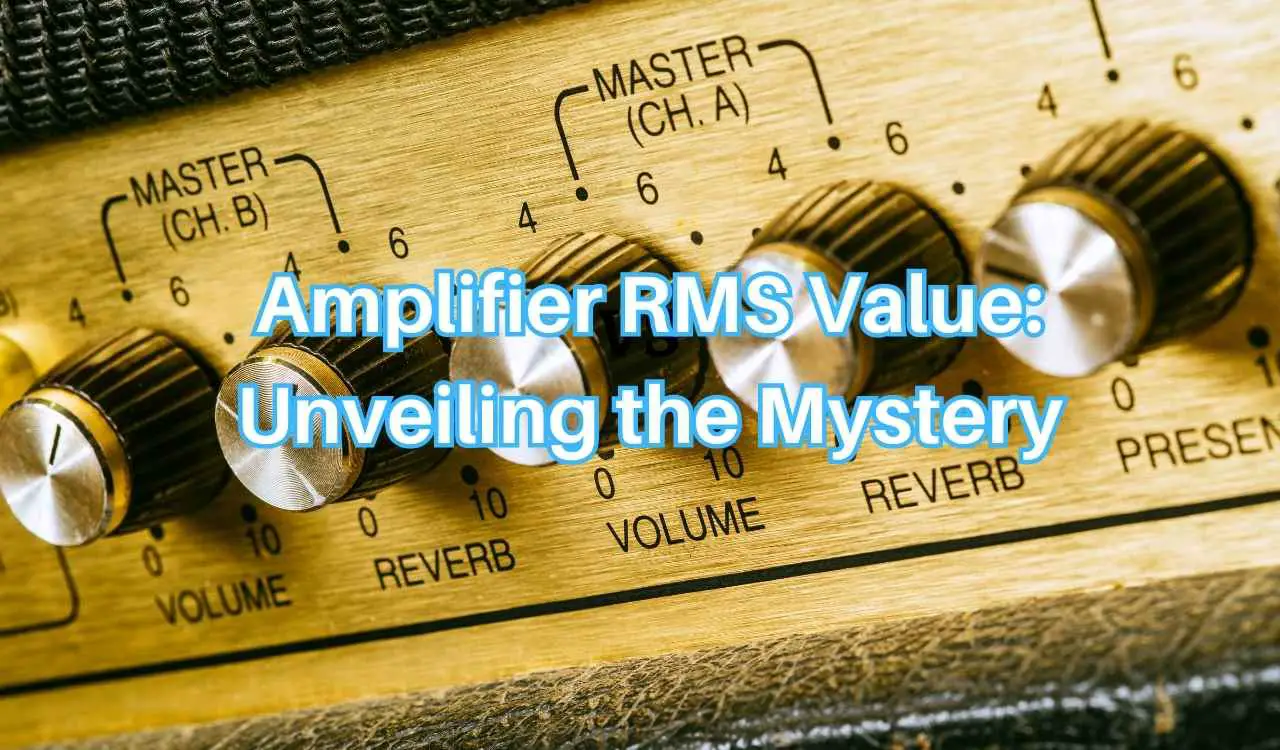As an expert in the car audio field, I understand the importance of achieving the best sound quality in your vehicle.
To achieve this, it is crucial to have a comprehensive understanding of the RMS (Root Mean Square) value of your amplifier. The RMS value is a fundamental measurement that determines the power output of an amplifier accurately.

In this article, we will delve into the world of car audio and explore how to calculate the RMS value of an amplifier like an expert.
Understanding RMS:
To begin our journey, let’s first grasp the concept of RMS. RMS refers to the root mean square, which is a mathematical calculation used to find the average power value of a varying electrical signal.
In the context of audio amplifiers, the RMS value represents the continuous power output that an amplifier can deliver without distorting the sound signal.
Calculation Method:
To calculate the RMS value of an amplifier, we need to consider two primary factors: the amplifier’s voltage and the speaker’s impedance. Let’s explore each factor in detail.
Amplifier Voltage:
To determine the amplifier voltage, you need to refer to the amplifier’s specifications or its documentation. Typically, the voltage rating is specified as the “RMS voltage” or “continuous power output” in watts. It is crucial to note that this value indicates the power output when the amplifier is operating at its maximum efficiency.
Amplifier manufacturers provide RMS power ratings to help consumers understand the amplifier’s power capabilities accurately. It is important to choose an amplifier that can provide enough power to drive your speakers effectively without causing distortion or damage.
Speaker Impedance:
The speaker impedance is another crucial factor in calculating the RMS value. It refers to the resistance offered by the speaker to the flow of electrical current. Speaker impedance is measured in ohms and can typically range from 2 to 8 ohms, although other values may also exist. Refer to the specifications of your speakers to determine their impedance.
Speaker impedance plays a significant role in matching the amplifier to the speakers. Amplifiers are designed to work optimally with specific impedance loads. It is essential to ensure that the amplifier’s impedance range matches or is compatible with the speaker’s impedance. Mismatches can result in poor sound quality, reduced power output, and potential damage to the amplifier or speakers.
RMS Calculation Formula:
Once you have the amplifier voltage and the speaker impedance, you can use the following formula to calculate the RMS value:
RMS (Root Mean Square) = (Voltage^2) / Impedance
The RMS calculation formula helps determine the continuous power output that an amplifier can deliver to a specific speaker impedance. By using this formula, you can assess the compatibility between your amplifier and speakers, ensuring they work harmoniously together.
Example Calculation:
Let’s consider an example to illustrate the calculation. Suppose you have an amplifier with an RMS voltage of 50 watts and a speaker impedance of 4 ohms. Applying the formula, we get:
RMS = (50^2) / 4
= 2500 / 4
= 625 watts
In this example, the RMS value of the amplifier is calculated as 625 watts.
Implications and Considerations:
Understanding the RMS value of your amplifier helps in making informed decisions when it comes to selecting speakers and setting up your car audio system. By ensuring that the RMS values of your amplifier and speakers are compatible, you can avoid damaging your equipment and enjoy optimal sound quality.
Power Handling Capability:
Matching the RMS power handling capability of your speakers with the amplifier’s RMS power output is crucial. The power handling capability of speakers refers to the maximum amount of power they can handle without distortion or damage. Exceeding the power handling capacity can cause the speakers to overheat, resulting in reduced audio quality or even permanent damage.
It is recommended to choose speakers with power handling capabilities that slightly exceed the amplifier’s RMS power output. This allows some headroom and ensures that the speakers can handle sudden bursts of power without compromising performance.
Amplifier Efficiency:
Amplifier efficiency plays a role in the actual power delivered to the speakers. While the amplifier’s RMS power rating represents its maximum power output, the efficiency determines how much of that power is converted into useful audio output.
Amplifiers with higher efficiency ratings convert a larger percentage of the electrical power into audio output, resulting in better performance and reduced strain on the electrical system of your vehicle. Efficient amplifiers can deliver more power to the speakers, ensuring cleaner sound reproduction and maximizing the RMS value.
Clipping and Distortion:
Clipping occurs when an amplifier is pushed beyond its RMS power limits, causing the waveform to be cut off or “clipped.” This results in distorted sound reproduction and potential damage to the speakers. It is important to avoid operating an amplifier near or beyond its maximum RMS power output to prevent clipping.
By calculating the RMS value of your amplifier and matching it with the speaker’s impedance, you can ensure that the amplifier operates within its safe limits, reducing the risk of distortion and protecting your speakers from potential damage.
Conclusion:
Calculating the RMS value of an amplifier is a vital skill for any car audio enthusiast or professional. By understanding the relationship between amplifier voltage and speaker impedance, you can ensure that your audio system delivers the best sound quality without compromising the longevity of your equipment.
Remember to consult the specifications of your amplifier and speakers to obtain accurate values for the calculation. By applying the RMS calculation formula, you can confidently choose the right components for your car audio system and embark on a journey of unparalleled sonic excellence.
Keep exploring the world of car audio, and let the power of RMS unleash the true potential of your vehicle’s audio system! With the knowledge gained from understanding the RMS value, you can optimize your car audio experience, ensuring every drive is filled with exceptional sound quality.
